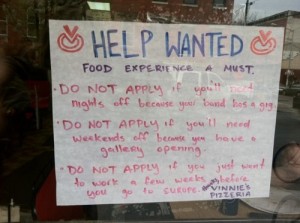We can talk all we want to about how college should stop doing this and start doing that, or how it just should not be a requirement, etc. etc. We have been talking all we want to for years now.
Are we changing anything yet?
In some ways, we are. Though we are still in the minority, the rise against higher education is happening. Some of us have started our own businesses, some of us are traveling the world. Some of us have sought life’s answers outside the doors of a university only to find, years later, they are led back to those doors, with tons more purpose and determination.
This morning I read two interestingly similar articles sent to me by my friend Todd and my mom, respectively: “My Fellow Americans, It’s Time to Boycott College” by Matt Walsh, and “4 Radical Ideas for Reinventing College” by Margaret Rhodes.
In the first article, Matt Walsh (a man whose ideals and ideologies I usually detest but we seem to be on the same side on this subject I’ve done my best to get over myself) details a story about his friend who couldn’t get into a field he had years of hands-on experience in because he lost every job prospect to a recent college graduate.
The entire post is very stand-up-and-rise-against inspirational/motivational stuff, but what he is proposing is, unfortunately, worlds away from happening, if ever – let’s literally boycott college. Let’s just not go, not advocate for our children to go unless they want to be a neuroscientist, and I guess by default all those lazy employers will realize, “oh man, all of my applicants only have real-life hands-on experience, so which one am I supposed to pick??”
This would be a fine and dandy notion to entertain if we could actually just convert the majority of would-be college-goers to not going to college and then go around explaining to businesses the drop in degreed applicants – it might take a few hundred years, but it could happen!
The second article explains how Design Students from Stanford University put together a video interview project with subjects from the school and from other backgrounds such as leaders of rehabilitation programs and people from varieties of different careers. (The second half of the headline of the article, “Drawn from Stanford Research”, is highly misleading, sounding as if this was an official academic study; and though it is absolutely not, the Design Students came up with good points regardless.)
The Design Students took into consideration the thoughts and feelings they were hearing again and again in these interviews and came up with the “four smart proposals for reinventing college.”
Mostly, these proposals boiled down to all the stuff we’ve been saying for a long time. “Liberal arts” degrees don’t apply to everyone or ever major. Classes need to be less lecture, more hands-on. Picking a Life Path right out of high school is stupid (but high schoolers are the only ones who see this, and not the grownups?). Et Cetera.
Like I said, we’ve been saying things need to change. But are we going to change it? Yes? Then how? What are you going to do right this second to change the entire college-centered system of the western world?
*blink* *blink*
Now, I will grant you that those students at Stanford are indeed taking their findings and starting a true campaign for universal life-long learning. The official website is set in the future ‘looking back’ on how the higher education system was transformed around the year 2025. It’s really, really cute.
But. Perhaps the whole notion shouldn’t be how we are going to change the world by reinventing college, or how we are going to change college by reinventing the world.
That is not going to work, and we cannot just go around in life expecting anything that doesn’t work for us to change around us so that we can have a better chance at success. The antelope doesn’t just loaf around thinking, “Well if things would just get better in the food chain I wouldn’t HAVE to be on the alert, I wouldn’t have to drop dinner at a moment’s notice an run for my life, I could eat in bloody PEACE for once in my life, why doesn’t somebody DO something???” No. That antelope fucking pays attention and RUNS LIKE HELL. So – life lesson from the antelope today: pay attention and run like hell. You aren’t going to succeed without a degree if you’re just waiting for the system to change – you’ve just got to go succeed anyway. It’s a hard, hard life in the safari – but don’t give up. You’ll make it.




